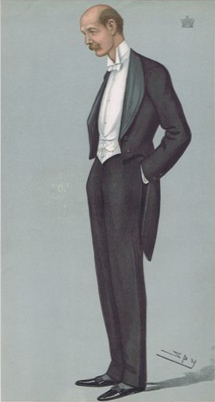Lord Edward Cecil facts for kids
Quick facts for kids
Lord Edward Cecil
KCMG DSO
|
|
|---|---|

"at Mafeking" Cecil as caricatured by Spy (Leslie Ward) in Vanity Fair, November 1899
|
|
| Birth name | Edward Herbert Gascoyne-Cecil |
| Nickname(s) | Nigs |
| Born | 12 July 1867 Hatfield House, Hertfordshire, England |
| Died | 13 December 1918 (aged 51) |
| Allegiance | |
| Service/ |
British Army |
| Years of service | 17 years |
| Rank | Brevet Lieutenant-Colonel |
| Unit | Grenadier Guards |
| Commands held | ADC (Egypt) to Lord Kitchener, Military Secretary to Lord Kitchener. |
| Battles/wars | Second Boer War |
| Relations | Marquess of Salisbury |
Lord Edward Herbert Gascoyne-Cecil (born July 12, 1867 – died December 13, 1918) was an important and highly respected English soldier. He also worked as a colonial administrator in Egypt. He helped make big changes to the British Army as an advisor to the government.
Contents
Lord Edward Cecil: A British Soldier's Story
Lord Edward Cecil was the fourth son of Robert Gascoyne-Cecil, 3rd Marquess of Salisbury. His father was a very important politician, serving as Prime Minister of the United Kingdom. Edward went to Eton College, a famous school in England.
Early Military Career and Adventures
In 1887, Edward Cecil joined the Grenadier Guards as a Second Lieutenant. This was a well-known regiment in the British Army. After four years, he was promoted to First Lieutenant. He then joined the staff of Field Marshal Garnet Wolseley, a very senior military leader.
Service in Egypt and Sudan
Lord Edward Cecil showed great skill during the Dongola Expedition in 1896. He was recognized for his bravery and promoted to Brevet Major. He also received special awards like the Order of Medjidie and the Khedive's Star for his service in Egypt and Sudan. During this time, he worked closely with Lord Kitchener, who became a major influence on his career.
In 1897, Cecil was part of a special group called the Rodd Mission. They traveled to meet Emperor Menelik II of Abyssinia (modern-day Ethiopia) to negotiate a treaty.
The Fashoda Incident
A year later, in 1898, a tense situation called the Fashoda incident happened. A French expedition led by Captain Marchand claimed an area in present-day South Sudan for France. This challenged British and Egyptian claims. Lord Edward Cecil arrived at Fashoda with Lord Kitchener's forces. They met with Marchand, and after discussions, the French troops left the area. This event brought Britain and France close to war but was resolved peacefully.
Cecil was also present at the battle of Omdurman. This battle was a major victory for the British and Egyptian forces in Sudan. For his actions in these campaigns, he was again mentioned in official reports for his bravery.
The Siege of Mafeking
In July 1899, Lord Edward Cecil was sent to Mafeking in South Africa. He served as the Chief Staff Officer to Colonel Baden-Powell. Cecil quickly arranged for a large amount of supplies, expecting a long conflict.
Mafeking soon came under siege during the Second Boer War. This meant the town was surrounded by enemy forces. As second-in-command, Cecil was in charge of making sure the town had enough food. When supplies ran low, people had to eat unusual things like dogs and horses to survive. The siege lasted for seven months.
Founding the Mafeking Cadet Corps
During the siege, Cecil helped set up the Mafeking Cadet Corps. This was a group of young boys who helped with tasks like delivering messages. This idea later inspired Baden-Powell to create the Scouts movement, which became famous worldwide.
When the siege was finally lifted in May 1900, there was great celebration in London. Lord Edward Cecil was welcomed home as a hero. He was recognized for his service during the war, receiving the Queen's Medal and being promoted to Brevet Lieutenant-Colonel.
Later Career and Family Life
After his service in South Africa, Lord Edward Cecil continued his career in Egypt. In 1902, he became the Military Secretary to Lord Kitchener. He later served as the Agent-General to the Government of Sudan and Director of Intelligence in Cairo.
In 1906, he returned to Britain and was invited to join the new Liberal Government. He served as Under-Secretary of War and then as Under-Secretary of Finance. From 1912 until the end of World War I, he was a Financial Advisor to the War Office. In 1915, he received another important award, the Grand Cordon Order of the Nile.
Marriage and Children
Lord Edward Cecil married Violet Georgina Maxse in 1894. They had a son and a daughter. Their son, George Edward Gascoyne-Cecil, was born in 1895. He followed in his father's footsteps and became a second lieutenant in the Grenadier Guards. Sadly, George was killed in action in France during World War I in 1914. Their daughter, Helen Mary Gascoyne-Cecil, was born in 1901 and later became an author.
Lord Edward Cecil spent the last year of his life in Switzerland, receiving treatment for tuberculosis. He passed away in December 1918.
Published Work
Lord Edward Cecil wrote a book called The Leisure of an Egyptian Official. It was published after his death in 1921. The book shares details about his work and experiences with Egyptian politicians.
 | Roy Wilkins |
 | John Lewis |
 | Linda Carol Brown |

